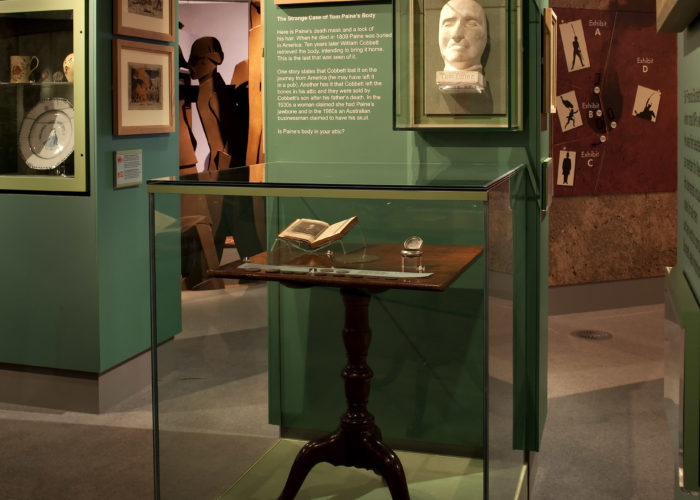Tom Paine’s writing desk
Theme: American war of independence (1775 - 1783), Political Revolution, Revolutionary ideas, American revolution, Printing revolution
Thomas Paine was a radical political philosopher and advocate of human rights. He was one of the most influential writers and activists of his time who heavily influenced the American and French revolutions.
Thomas Paine was born in Norfolk in 1737. As a young man he held various jobs, working for his father as a corset maker, as a school teacher and in minor government positions. After meeting Benjamin Franklin in 1774, he emigrated to the British American colonies in what is now the United States, arriving as the revolutionary conflict escalated.
His ideas were instrumental in transforming unrest and rebellion in America into a fully fledged political revolution.
In early 1776, Paine published his famous pamphlet Common Sense. It clearly set out a vision of independence from Britain for America, including rejection of the British monarchy and the creation of a new federal republic. Written to appeal to ordinary people, it was an instant bestseller and is reported to have sold 120,000 copies in the first three months. His ideas were instrumental in transforming unrest and rebellion in America into a fully fledged political revolution. Paine’s dream of independence was approved by the Continental Congress in July 1776, and he subsequently fought for the American Patriots in the revolutionary war (1775-83), helping sustain morale with other pamphlets. Victory resulted in the independence of thirteen colonies from British rule and the formation of the United States of America.
Paine’s inspirational words, along with the viewpoints of others, about the republican experiments in the new United States, were to help incite and influence the outbreak of the French Revolution in 1789. In 1791 he wrote another of his famous works, ‘The Rights of Man’, partly in defence of the French Revolution and of the right to revolt against leaders who do not safeguard the natural rights of their people. It sold almost a million copies. The following year, he wrote a second part outlining his ideas about a just society, including abolition of the monarchy, progressive taxation and the right of all men to vote. Following the publication of The Rights of Man, Paine was forced to flee Britain to France where he was celebrated as an honorary citizen and invited to join the National Convention in 1792. He returned to the United States in 1802 and died there in 1809.
Paine used this table as a writing desk while staying with Thomas Clio Rickman. It was here that he wrote the second part to The Rights of Man. The writing on the plate is a testament to Thomas Paine’s legacy and the enormous influence of his writings. It reads: ‘this plate is inscribed by Thos. Clio Rickman in remembrance of his dear friend Thomas Paine who on this table in the year 1792 wrote several of his invaluable works.’
Did you know..?
Common Sense was so influential that John Adams said: “Without the pen of the author of Common Sense, the sword of Washington would have been raised in vain”
During the Reign of Terror, in revolutionary France, Paine was arrested and sentenced to death. He was saved from the guillotine by a mistaken chalk mark on the door of his cell.
Sources & acknowledgements
This object description and its related educational resources were researched and written by our team of historians and education specialists. For further information see the item’s home museum, gallery or archive, listed above.
-
Did you know..?
During the Reign of Terror, in revolutionary France, Paine was arrested and sentenced to death. He was saved from the guillotine by a mistaken chalk mark on the door of his cell.
-
Education overview
You can access a range of teachers resources related to this object and more on our education page.
Please also see our glossary of terms for more detailed explanations of the terms used.
-
Curatorial info
- Originating Museum: Peoples History Museum
- Accession Number: NMLH.1993.67
-
Use this image
You can download this image for personal and educational use but please take note of the license type below.
- Rights Holder: Peoples History Museum
- License Type:
Find it here
This object is in the collection of People’s History Museum



